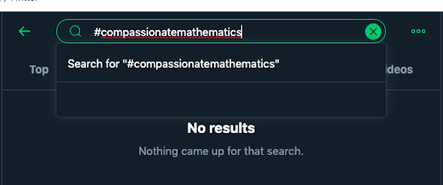|
I recently conducted a Twitter search that surprised me. I was expecting to find a few more results for #compassionatemathematics. Is the lack of results because many adults associate mathematics with negative feelings and the word compassion is the farthest thing from their minds when they hear the word math? Math trauma is definitely a 'thing.' Is it because compassion is often associated with with humanities and not sciences?
Oxford defines compassionate as "feeling or showing concern for others." When I reflect on my time as a student, I don't think I always showed much concern for others. In 3rd grade, I was the first student in my class to memorize all the times tables. When we started studying multiplication, we had a daily quiz starting with the 1 times tables, working up to the 12s. Each student had a paper ice cream cone on the class bulletin board. If you scored perfect on the daily quiz, you placed a paper scoop of ice cream on your cone. The first student with 12 scoops won a Coke. Did I care about the other students who took longer to reach that goal? Nope. Give me my Coke. I won that Coke. And I definitely felt like I was smarter than others because I won the race to the top of my ice cream cone. The system of math education that ensued rewarded memorizers like me while leaving others feeling like they didn't have the 'math gene.' I wouldn't define it as very compassionate. Interestingly enough, Oxford defines compassion as “sympathetic pity and concern for the sufferings or misfortunes of others." Oh my. Maybe compassionate mathematics isn’t a ‘thing’ because too many math learners are busy pitying themselves as they suffer through textbook pages of problems that can be solved by procedures or memorized algorithms. How can they feel compassion for others when they themselves are mired down with rote math learning? Or maybe students are too busy working through textbook practice pages of similar problems instead of communicating and exploring with one another. When I hear “compassionate mathematics” perhaps I am thinking about how mathematics can be taught in a more humane way? This has been on my radar lately because of a recent Virtual Conference on Humanizing Mathematics that I've been following. But humanizing math and showing compassion are not the same thing. I dislike the word 'pity' but the word concern resonates with me. How can we help students show more concern for others during math class? One way is to provide them with learning opportunities that connect them with other students in meaningful ways. Jo Boaler is leading the charge with this. Her resources on youcubed provide examples that encourage students to make sense of mathematics while recognizing that often there is more than one way to approach a problem. I can't help but wonder what connections I might have made as a third grader if I had been given the opportunity to explore something like the Four 4's problem with my classmates instead of racing against them to recall my 8 times tables. What can we do as teachers to be more compassionate towards our math learners? We can be concerned when a student is having an “off day” and can’t seem to get their head in the game of math. Instead of carrying on through a lesson that few students are understanding, we can pay attention to our students and their visual cues that they 'aren’t getting it.' We can find ways to make the math meaningful and relevant to them. We can make changes if a student does feels like he or she does not have a place in our math classroom. Again, Jo Boaler reminds us that there is no math gene and all students can learn math to the highest level. As a high school teacher, at times I prioritized math and the race to cover the syllabus over the needs of the humans I was teaching. I regret that now as I definitely was not showing much compassion. Ultimately, compassionate math is much more than going to youcubed and downloading some mindset posters to put on your walls. It's a mindset that needs to be explored, pondered, and cultivated with like-minded educators. I think there’s also an important self-compassion piece to it. More on that later. P.S. I hold no ill-will or judgement towards my third grade teacher. She was a wonderful teacher and I know that she was doing exactly what most teachers did in a 1981 math class. I wonder what learning environment she might have created with youcubed as one of her resources?
5 Comments
9/5/2019 09:48:17 pm
Interesting enough, it is through my own exploration of Self-compassion that I have healed my own math trauma and embraced it. As a Mindfulness educator I’ve also been giving a lot of thought toward developing a mindfulness for math anxiety practice to help my students. And of course Nicole, you have helped me tremendously in my growth toward math, now being my favourite subject to teach!
Reply
Nicole
9/10/2019 09:55:19 am
Yes! Writing this made me think a lot about self-compassion and teaching. Your comments are now making me think about the mindfulness/math connection. Thanks for commenting!
Reply
Melissa Danner
9/23/2019 01:20:39 am
I truly believe everything happens for a reason and I cannot explain what exactly compelled me to reach out to you when I did, but the timing was spot on. I start my year with a Four-9's and Four-4's activity. A few years back, I almost ditched the activity so I could jump into my curriculum sooner to meet state testing pressures. I couldn't let it go and I still start my year with it. This reinforces that decision. And the response about Mindfulness... wonderful! I started incorporating Mindfulness into my classroom routine regularly. I am starting a Mindfulness club and a Mindful Moments and Homework Help after school program this year. After 24 years of teaching, I am still figuring out who I am as a math educator. Thank you for helping me reinvent myself.
Reply
Nicole
9/24/2019 09:52:58 am
I am so excited to hear this, Melissa. Thank you for sharing. I love to hear that after 24 years you are still figuring things out - me too! That is the beauty of learning and growing. Keep me posted on the mindfulness/math connection. 🌸
Reply
10/15/2020 12:16:05 pm
It's really sad that I just learned about the concept of compassionate education. I was fascinated by the idea of bringing a compassion to school. The first thing that comes to my mind when studying the concept of compassion is how to bring this concept to learning mathematics. And lead me to your writing. I am currently take a doctorate program, and I am interested in studying this theme. Thank you
Reply
Leave a Reply. |
Nicole FedioMathematics Consultant at Mathematique Archives
February 2020
Categories |


 RSS Feed
RSS Feed
